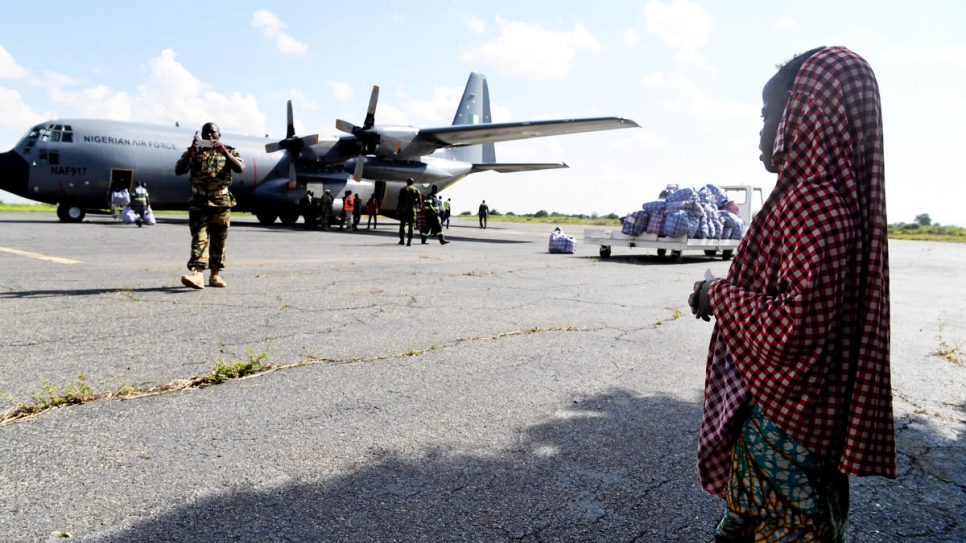After years in exile, Nigerian refugees finally return home
UNHCR assists over 100 Nigerian refugees in Cameroon to return to northeastern Nigeria
The group of 132 refugees walk in a line towards the plane that will take them back home to Nigeria.
© UNHCR/Xavier Bourgois
The community centre at Minawao refugee camp in northern Cameroon is a hive of activity. Everyone is busy packing up their belongings - some acquired here over time, a few, carried when they fled.
The atmosphere is thick with excitement and anxiety. This is the group's last night in the camp before they return home to Nigeria after living in exile for six years.
Ayouba stuffs everything he owns in a bag - some plates, pens, a torch and some worn-out clothes. Before he fled threats from Boko Haram in 2014, he was a farmer and trader.
“I am hopeful that life can go back to what it was before,” says the father of seven, who’s last three children were born in the camp. This is all they have known as home.
Nearby, Alim, who also came to Minawao in 2014, has his identity verified for the upcoming trip.
“I am hopeful that life can go back to what it was before.”
“I met my wife here, I had my two children here and I worked as a community worker here,” says the 31-year-old. “I made many friends but now, it is time to go home.”
This year, UNHCR, the UN Refugee Agency, in collaboration with the Governments of Cameroon and Nigeria, started a process of voluntary returns for Nigerian refugees in Cameroon. Those who choose to go back are returning to Adamawa and Bauchi States in northeastern Nigeria, where the security situation has improved over the years.
Since 2014, violent attacks by Boko Haram have displaced over 240,000 Nigerians, with nearly 108,000 of them seeking refuge in Cameroon. Nearly 60,000 refugees are currently living in Minawao camp, while about 44,000 others live among local host communities.
Like Ayouba and Alim, Aissatou opted to join the 134 refugees returning home.
As she climbs into one of the vehicles taking the group to the airport, an emotional Aissatou holds back tears as she grasps the hand of Gertrude Etobe, UNHCR’s Community Services Assistant based in Yaounde.
“I welcomed Aissatou and many other families here six years ago,” says Gertrude. “I saw children born and raised here. It is difficult to see them go.”
Lami Pius, 43, has waited for this moment for years. She fled for Cameroon with her husband and children after their village was attacked. In Minawao, she was reunited with two of her children who got lost while crossing the border.
Tragedy struck again when a month later Lami lost her husband.
“He died in my arms and there was nothing I could do. I have longed to return to my country since then,” she says.
On hand to officiate over the maiden flight are two government officials - Sadiya Umar Farouq, the Nigerian Minister for Humanitarian Affairs, Disaster Management and Social Development and Mijiyawa Bakari, the Governor of Cameroon’s Far North region.
As Lami joins the rest to board the Nigerian Air Force’s Hercules C130 plane, tensions loosen and some people begin to cry. Refugees and humanitarians hug each other goodbye.
“It does hurt! We have come to know each other, appreciate and love each other and now they are leaving,” says one of the drivers as the plane took off.
In almost two hours, the plane touches down in Nigeria, reuniting families with their home country and loved ones.
Lami’s nerves melt away as she joins Alim, Assaitou and the rest of the returnees on to the tarmac to a large, welcoming group of UNHCR and aid agency staff, led by Malam Bashiru Ahmad, the Secretary of Adamawa State Government.
“I want all Nigerians back in the camp to know that it is wonderful here.”
She happily bundles her ten children into the waiting minivan that will take them to a transit centre before they continue on to their final destination.
“Please tell everyone our story. I want all Nigerians back in the camp to know that it is wonderful here,” she says as she holds her 3-month old daughter closer.
Alim is equally excited to be back home.
“First, I will study and then I would love to trade in clothes,” he says with a smile.
The returnees will go on to the areas of return in Mubi North, Mubi South, Madagali, Michika and Yola North in the State of Adamawa and Azare in the State of Bauchi, where they will restart their lives.
This first set of voluntary returns falls within the framework of the tripartite agreement signed on 02 March 2017 between the governments of Cameroon and Nigeria and UNHCR, to ensure voluntary repatriation for Nigerian refugees in Cameroon.






